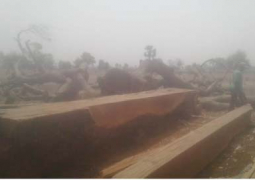
“We want to lead the stop-rice-and-vegetables importation campaigns of other regions,” they said.
The two governors gave this assurance while delivering their speeches during the regional launching of GCAV in the North Bank Region and Central River Region over the weekend.
According to them, the launching of the GCAV in their regions was another development that aims to improve the lives of smallholder farmers, under the able leadership of President Yahya Jammeh.
“Its aim is to improve production, productivity and access to markets for targeted agricultural commodities for small-scale farmers,” they said.
“It is one of the key projects that will provide resources that will significantly contribute to the achievement of Vision 2016,” they added.
They were reliably informed that under the GCAV, participating farmers would be supported to develop and put in place the requisite production, processing and marketing infrastructure and equipment and would also be equipped with skills to correctly operate in a business-oriented fashion.
“We pledge our support to the project, and all those who shall be participating and looking forward to the incomes of our people to be better during and at the end of the project,” they added.
The role of women in this endeavour could never be doubted and does not need to be overemphasised, Governor Jammeh said.
Women in the NBR have demonstrated their tireless commitment to all-year-round food production with most of their dry season activities concentrated on vegetable production, he said.
The GCAV management and sponsors have assured him the project would help such groups of farmers to produce more, Governor Jammeh went on, adding that it would also lead to “better quality produce, better household income, better quality of life, as well as reduce poverty for the NBR population and the whole of Gambia.
Governor Queen Jammeh and Governor Khan also challenged those who would participate in the GCAV project with various roles, to work together and come up with important recommendations that would eliminate the constraints and difficulties encountered by farmers.
It would as well lead to better production and income, quality of life for smallholder farmers and sustained food security at the household, regional and national levels.



